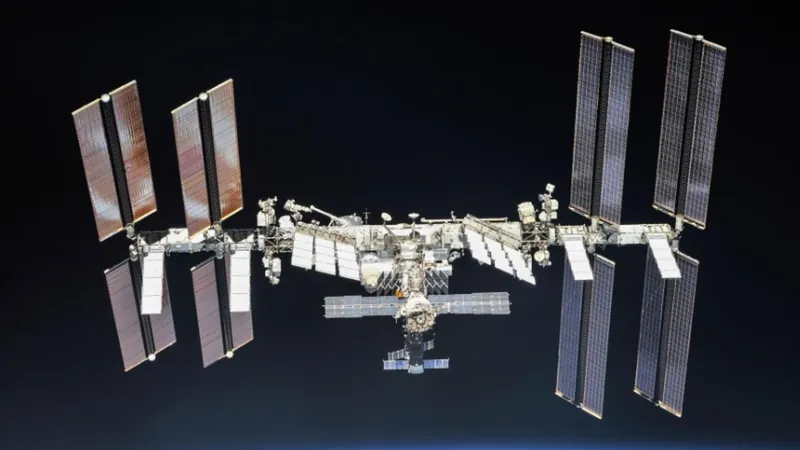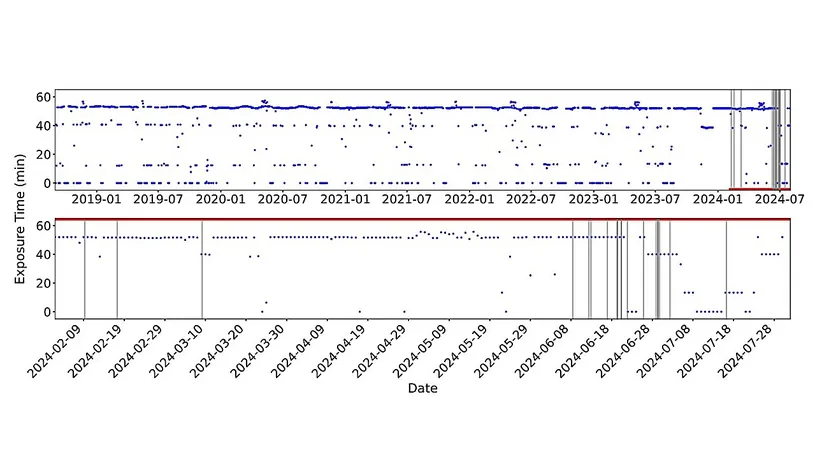
NASA's Alarming Verdict: Is the ISS Leak Really 'Catastrophic'?
2024-11-16
Author: Siti
In a startling development, NASA has raised the alarm regarding an ongoing leak on the International Space Station (ISS), calling it a "catastrophic" threat that could compromise both crew safety and the station's future viability. This issue centers on a section of the ISS managed by Russia, which has been allowing breathable air to escape for several years.
The Leak: A Growing Concern
Reports indicate that the ISS, spanning the size of a football field, has been experiencing leaks since they were first detected in 2019. The leaks are believed to originate from a tunnel linking the Zvezda service module—which was launched in July 2000—to its docking port, where resupply spacecraft arrive.
NASA has highlighted the significance of this leak: astronauts rely on the ISS to maintain a pressurized environment filled with breathable gases. Recently, the leak's impact has intensified, with air escaping the station at an alarming rate of 1.7 kilograms per day as of April 2024. This sharp increase in air loss has escalated concerns around the integrity of the ISS.
Divergent Views: NASA vs. Roscosmos
Tensions are on the rise between NASA and the Russian space agency, Roscosmos, as both organizations grapple with the implications of the leak. Roscosmos attributes the leak to high cyclic fatigue stemming from micro-vibrations within the module, while NASA posits that a combination of factors—including pressure fluctuations, mechanical stress, material vulnerabilities, and environmental exposure—plays a significant role.
Recent findings from NASA’s Office of Inspector General underscore the critical nature of this issue, with officials voicing grave concerns regarding the crew’s safety. Bob Cabana, a former NASA astronaut and chair of the ISS Advisory Committee, warned that the structural integrity of the affected module could lead to "catastrophic failure."
Despite Roscosmos's insistence that operations remain safe, Cabana notes that the Russian team has failed to assuage U.S. concerns regarding the leak's impact. The differing assessments were further illuminated during a recent meeting in Russia, where disagreements remained unresolved.
Seeking Solutions: A Call to Action
In a bid to resolve these conflicting opinions, NASA has proposed engaging neutral experts from both countries to investigate the leak's root causes. While the U.S. has mobilized its team of experts, Roscosmos has yet to respond to this recommendation, leaving the issue lingering unresolved.
Nonetheless, communication lines between NASA and Roscosmos remain open. Astronaut Michael Barratt, who recently completed a lengthy mission aboard the ISS, emphasized that astronauts and cosmonauts have been instructed to take precautionary measures, which include keeping the leaking section sealed unless absolutely necessary.
The Road Ahead: A Space Station on the Brink
As the ISS approaches its fourth decade in operation, astronauts continue to face real risks from this escalating leak. With both NASA and Roscosmos working under increasingly stressful conditions, the international collaboration that the ISS represents is now more crucial than ever. The shared objective remains clear: ensure the safety of the crew while maintaining an operational ISS.
Could this situation lead to a reevaluation of how international space partnerships operate? Only time will tell, but one thing is certain: the eyes of the world are on the ISS and the agencies responsible for its fate.



 Brasil (PT)
Brasil (PT)
 Canada (EN)
Canada (EN)
 Chile (ES)
Chile (ES)
 España (ES)
España (ES)
 France (FR)
France (FR)
 Hong Kong (EN)
Hong Kong (EN)
 Italia (IT)
Italia (IT)
 日本 (JA)
日本 (JA)
 Magyarország (HU)
Magyarország (HU)
 Norge (NO)
Norge (NO)
 Polska (PL)
Polska (PL)
 Schweiz (DE)
Schweiz (DE)
 Singapore (EN)
Singapore (EN)
 Sverige (SV)
Sverige (SV)
 Suomi (FI)
Suomi (FI)
 Türkiye (TR)
Türkiye (TR)